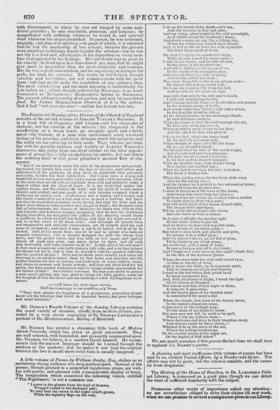A little volume of Poems, by William Danby, Esq., strikes
us as .containing strong evidence ofa deep poetical spirit. Several of the poems, though pitched in a somewhat lugubrious strain, are written with power, and adorned with a considerable display of fancy. The imagination which conceived the following verses, entitled "The Nightmare," is not a common one.
"I come in the gleams from the land of dreams, Wrapp'd round in the darkness' pall; Ye may hear my moan in the night-wind's groan,
When the tapestry flaps on the wall. I sit on the breast of the death-owl's nes, And she screams in fear and pain; And my wings glare bright in the wild moonlight, As it whirls round the madman's brain; And down sweeps my car, like a falling star, When the winds have husli'd their breath, And ye feel in the air from the cold sepulchre The faint damp smell of death.
My vigil I keep by the murderer's sleep, When dreams round his senses spin,— I ride on his breast, and trouble his rest, In the shape of his deadliest sin ; And hollow and low is the moan of wo, In the depth of his strangling pain, And his cold black eye rolls in agony, And faintly rattles his chain : The sweat-drops fall on the damp prison-wall He wakes with a deep-drawn sigh ; He hears my tread as I fly from his bed, And he calls on the saints on high. • And stilly I crouch by the sick man's couch, I stifle his slumbering breath, And I cramp rack his bones as he shudders and groans In the seeming pangs of death ; And words unknown, 'twixt a sigh and a moan, In his horrible dread he utters, As the dying breathe, to the messenger Death, In wild delirious mutters, When he comes to bear the soul through the air,
To Him who alone can save it,
When mortality must return to her dust, And the spirit to Him who gave it.
I fly to the bed, where the weary head Of the poet its rest must seek, When dreams of fame enkindle the flame
Of joy on his pallid cheek :
No thought•does he take of the world awake.
And its cold and heartless pleasure; In the holy fire of his own loved lyre, Is his best and his dearest treasure : 'With my terrible sting, that cheek I bring To a darker and deadlier hue ; When his last dear token, his lyre, is broken, His heart is broken too.
'When the maiden asleep for her lover doth weep
Afar on the rolling sea,—
And she dreams he is press'd to her welcoming breast, Return'd from his dangers free; I come in the form of the wave of the storm,
And sweep him away from her heart,— And then from her dream she awakes with a scream
To think that in death they part ; And still in the light of her dream-bound sight, The images whirl_and dance, Till my swift elision dispels the vision, And she starts as from a trance.
In dreams I affright the startled sight Of the miser wither'd and old, And he strives to arise with horrible cries,
As he thinks of his stolen gold,—
But faint is each limb, and ghastly and grim, He groans with a stifled gasp ; And his sinews I strain, on his bed of pain, Till he faints in my elvish grasp ; An awful one, with a hand of hone, Seems to beckon him off to the tomb ; And I laugh as I whirl through the night's black furl, In the film of the darkness gloom.
When the sweet babe lies with half-closed eyes, As blue as the sky of even, And ye know the while, by its innocent smile, That its dreams are of joy and Heaven, I steal to the bed where that gentle head In meek composure lies, And, with phantoms of fright, I break the light Of its visions of Paradise : The horror and fear of that night so drear, Is long ere it pass away ; And the tearful glare of my fiendish stare Is remember'd for many a day.
When the clouds, first-born of the breezy morn, In the eastern chambers roam, I glide away in the twilight gray, To the mists of my shadowy home. But man may not tell, by word or by spell,
Where I rest my hideous form— Where darkness and sleep to their kingdom creep, And dreams rustle by like a storm,—
'Whether it be in the caves of the sea, Where the rolling breakers go, Or the crystal sphere of the upper air, Or the depths of Hell below.
We are much mistaken if this proves the last time we shall have to applaud Mr. DANRY'S poetry.
























 Previous page
Previous page